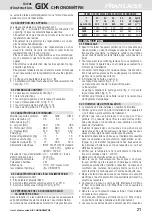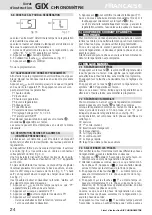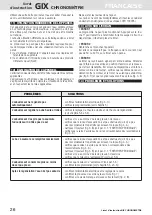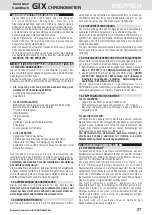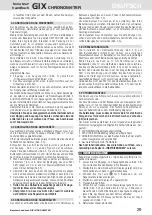
Instruction Manual GIX CRONOMETER
15
ENGLISH
We suggest using the method of installation described in fig.
3, as it includes a by-pass to avoid interruptions in the supply
water flow in case the equipment needs to be turned off, or if
maintenance is necessary.
Ensure that:
• The water inlet and outlet pipes (fig. 3) comply with the
norms on drinking water pipes.
• The water inlet pipe has an internal diameter of at least 8
mm.
We suggest installing a filter before the inlet pipe, to clean
the feed water.
Install on the water outlet a check valve (fig. 3, A) (DVGW, DIN
1988 T2) to protect the water softener from a reverse flow of
hot water that could cause damage.
Install a tap to take a sample of the outlet water, to test its
hardness.
All pipes must be free, not crushed or constricted.
Check for the presence of hygienic security taps on the
entrance and exit of the equipment. Remove them only
during this phase and not before.
3.4 CONNECTION TO THE DRAIN SYSTEM
Waste water resulting from the regeneration must be funneled
into the floor sink by the flexible pipe (fig.3, F) included in the
package.
Very often, the main cause for the water softener malfunctio-
ning is that this tube was not installed correctly. (fig. 4, A)
Tighten the rubber-holding joint included in the package (fig.
2, C) to the equipment flange, insert the drain pipe (fig. 3, F) in
the rubber-holding joint and place the other end of the tube in
the floor sink, ensuring that:
• f the floor sink is placed higher than the water softener, the
maximum height acceptable is 1.8 metres, provided that
the pipe is not longer than 5 metres and the pressure of
the water system is at least 2.8 bar (fig. 5).
• The pipe is not flattened or bent, as water should flow
without impedements (fig. 4, A);
• The drain pipe must never be directly connected to a si-
phon or to other drain pipes, to avoid reverse flows of water
and the contamination of the water softener.
• Keep the drain pipe suspended over and not immer-
sed in the water of the sink.
• Ensure that the pipe does not come out when the wa-
ter softener is doing the regeneration.
3.5 CONNECTION TO THE BRINE TANK
The valve is connected to the salt container by a pipe with a
diameter of 6 mm. Both the pipe ends are inserted into quick
joints (fig. 6, A).
To disconnect the pipe it is necessary to pull out the red secu-
rity clip, then press on the black ring that surrounds the pipe
next to the insertion, and extract the pipe.
To connect the tube safely, ensure that it is inserted all the
way in.
The installer must make sure the pipes and the joints con-
necting the valve and the brine are perfectly sealed, to avoid
air infiltration (fig. 6, A).
3.6 CONNECTION TO THE OVERFILL PROTECTION PIPE
The installation of an overfill protection pipe (fig. 3, E) on the
brine tank allows for the draining of possible excess of water
in the brine, that may be caused by faulty refills or working
malfunctions.
Drill a hole of 17 mm in diameter in the brine tank, around 10
cm under the lid, and tighten the overfill protection quick joint
(fig. 3, H). Insert the green flexible pipe (included in the packa-
ge) in the quick joint, then connect the pipe to a floor sink that
must be placed under the quick joint, because the water that
may come out will not be pressurized (fig. 4, B).
Do not put the overfill protection pipe (fig. 3, E) in the same
floor sink used for the drain pipe (fig. 3, F), to prevent any
possible reverse flows of water in the brine.
3.7 CONNECTION TO THE ELECTRICITY GRID
Make sure that the voltage of the electricity grid is compatible
with the voltage needed by the equipment.
Make sure that the plug is compatible with the socket. If in-
compatible, let qualified personnel change it. They will al-
so check that the cables are compatible with the absorbed
power.
IInstallation must be carried out in accordance with the
law on electrical systems, CEI 64.8.
This equipment was built in accordance with the essential
safety requirements set by the following European regulations:
• The 2014/30/UE Electromagnetic Compatibility Directive
• Norme: 2014/30/EU/(EMC), EN 55014-1:2017,
E N 6 1 0 0 0 - 3 - 2 : 2 0 1 4 , E N 6 1 0 0 0 - 3 - 3 : 2 0 1 3 ,
E N 5 5 0 1 4 - 2 : 2 0 1 5 2 0 1 4 / 3 5 / E U ( L V D ) , E N
60335-1:2012+A11:2014+A13:2017
• Product norms IEC/EN 60335-1:2010 on the Electrical
safety of electrical machinery for domestic use and similar
• It uses UL/CSA/VDE homologated components
• It is RoHS compliant
After the installation is complete, before opening the wa-
ter inlet and outlet taps, read chapter 4 “ACTIVATION”.
4) ACTIVATION
After the installation is complete, follow the procedure below:
1. Keep the water inlet and outlet taps closed (fig. 3, B, D),
then plug in the equipment.
2. Wait for the time to appear on the display; this is the
signal that the valve is working.
3. Press and hold the button for 5 seconds to start a
manual regeneration cycle.
4. Wait for the display to show C1.
5. Unplug the equipment.
6. Slowly open the water inlet by half (fig. 3, D) and leave it
in this position for about 2 minutes. Afterwards, open the
water inlet completely and let the water flow abundantly
from the drain pipe;
7. Pour water in the brine tank until it covers the air check
(fig. 1, D);
8. Plug in the fixture again.
9. Press the
N
and
h
buttons at the same time to pass to
step C2. Press the buttons again to pass to step C4 and
again to get to step C8.
10. Wait for the water softener to complete the cycle (it will
only take a few minutes) and to position on working mode.
11. Press and hold again the button for 5 seconds to start
a manual regeneration cycle.
Wait a few seconds for the valve to position itself on phase
C1.
12. Press the
N
and
h
buttons to pass to step C2, “SALT
INSERTION”. Check that the water in the brine tank is
sucked.
13. Press the
N
and
h
buttons at the same time to pass to
step C5.
14. Wait for the cycle to finish (it will take about 10 minutes).
15. Open the inlet and outlet taps completely (fig. 3, B, D) and
close the by-pass tap (fig. 3, C).
16. Add salt to the brine tank until a little bit more than half of
instruction
manual
GIX
CRONOMETER
Summary of Contents for GIX 12
Page 42: ...NOTES 42 ...
Page 43: ...NOTES 43 ...





















